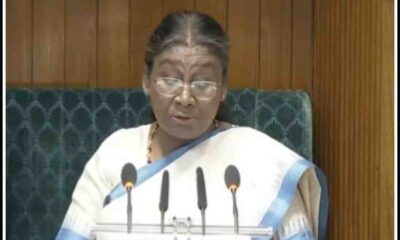News
According to the IMF, the Indian economy will grow by nearly 6% this fiscal year
Published
1 year agoon

According to the International Monetary Fund (IMF), India will have the world’s fastest-growing economy, with a 5.9% growth rate in the current fiscal year.
Report from the International Monetary Fund (IMF) on Indian Economic Growth
India’s economy is expected to grow at the fastest rate in the world, according to the International Monetary Fund (IMF), despite facing many difficulties, including financial instability, inflationary pressures, the impact of the Russia-Ukraine conflict, and the ongoing effects of the Covid-19 pandemic. The Indian economy is anticipated to expand by 5.9% in the current fiscal year, according to the IMF’s flagship World Economic Outlook report, which was published on April 11th.
The economy is in a recession versus inflation.
However, the IMF has cautioned that financial system disruptions could have a detrimental effect on global growth. the International Monetary Fund (IMF) has revised its global growth projections for 2023 in response to slowing economic activity brought on by higher interest rates and is issuing a warning that additional financial system instability could result in recessionary levels of output. According to the most recent World Economic Outlook report, real GDP growth will slow from 2022 levels, reaching 2.8% in 2023 and 3% in 2024.
Read Also:- Rajasthan lost by six wickets in the 1000th IPL game.
Key Points of Indian Economic Growth
India has established itself as a global symbol of strength by displaying remarkable resiliency in the face of formidable obstacles. Even though the IMF revised its growth forecast downward to 5.9%, India has managed to weather the storm relatively well.
In addition, the IMF’s biannual report projects that retail inflation will significantly decline from 6.7% to 4.9% in 2023–2024, a testament to India’s unwavering resolve and economic might.
India was commended by IMF Managing Director Kristalina Georgieva for using digitalization to combat the pandemic and generate new growth opportunities and jobs. According to Georgieva, India will be a “bright spot” in the global economy, contributing 15% to growth in 2023.
She also praised the Union budget’s balance of development needs, fiscal responsibility, and increased capital expenditure in ensuring India’s long-term growth.
What does the International Monetary Fund (IMF) Managing Director Kristalina Georgieva have to say about India’s economic growth?
The IMF is optimistic about India’s future success, as evidenced by its growth projections, which show the country’s unwavering strength and resilience. Georgieva’s comments are an emphatic endorsement of India’s innovative approach and unwavering commitment to progress, demonstrating the country’s economic agility and ability to overcome even the most difficult challenges.
Read Also:- 2022, Pakistan will be the largest recipient of ADB-funded programmes.
She praised the latest Union budget for striking a balance between meeting the country’s development needs and remaining fiscally responsible, increasing capital expenditure on critical infrastructure projects to lay a solid foundation for long-term growth and sustainable development.
She also praised India’s expanding investments in the green economy, such as clean and renewable energy, and expressed her hope that this fiscal responsibility would be translated into a medium-term framework that would serve as the foundation for India’s public finances.
However, it’s important to note that the Reserve Bank of India’s estimate of 6.4% for the current fiscal year beginning on April 1 is lower than the IMF’s growth projection for India.
What is the economic downturn?
India’s economy continues to be the fastest-growing in the world despite a decline in growth rate predictions. Early in April, IMF division Chief Daniel Leigh praised the robustness of the Indian economy. Anne-Marie Gulde-Wolf, the IMF’s deputy director for the Asia and Pacific region, anticipates continued growth for the Indian economy, which she says will keep it among the nations with the fastest rates of growth worldwide.
What does the IMF report say will happen to India’s economy and that of its neighbours?
In accordance with the most recent IMF report, China’s growth rate is predicted to be 5.2% in 2023 and 4.5% in 2024, with a growth rate of just 3% in 2022.
For 2023, the United States expects growth of 1.6%, while France expects growth of 0.7%. German and British economies may experience negative growth of 0.1% and 0.7%, respectively.
According to projections, India’s inflation rate will drop to 4.9 percent this fiscal year and 4.4 percent the following. However, it is anticipated that the rate of global growth will peak at 2.8% in 2023 before rising to 3% in 2024. With predictions of 7% for the remainder of the year before falling to 4.9% the following year, inflation is likely to remain high.
The report emphasised how supply-chain disruptions and rising geopolitical tensions have elevated the issue of geo-economic fragmentation to the forefront of policy discussions. As a result, nations with geopolitical alignment frequently draw more FDI, especially in key industries.
However, because many emerging markets and developing economies rely heavily on FDI from distant countries, they are extremely vulnerable to FDI migration, which could result in significant output losses.
On the plus side, the report forecasts that India’s real GDP growth rate will outperform both the United States and China, and strong growth indicates a growing economy with increased employment and consumer spending.
In fact, India, along with China, the United States, and Indonesia, is expected to contribute significantly to global growth by 2023. By 2028, India’s share of global GDP growth is expected to exceed that of France and the United Kingdom, establishing India as a key driver of global economic growth. With 20 countries accounting for 75% of global growth, India remains among the top contributors, cementing its position as a leading economic power.
Impact of the world recession on India
Despite ongoing challenges posed by the Covid-19 pandemic, financial sector turmoil, and inflation, the Indian economy is expected to grow strongly, according to the IMF’s World Economic Outlook report. India has received praise for its admirable resiliency, strategic use of digitalization, and investments in the green economy, positioning it as a key player in promoting global economic growth.
You may like
-


North Korea asserts that the test of a multiple-warhead missile was successful
-


The Student Wing of Congress storms the Exam Body NTA office and locks it from within
-


“During President Murmu’s address to Parliament, PM Modi was shown 73 times, and LoP Rahul Gandhi was shown six times”: Congress
-


NASA contracts Elon Musk’s SpaceX to deorbit the International Space Station in 2023.
-


A Caution For The CBI In The Delhi Court’s Arvind Kejriwal Custody Order
-


Bar Council of India requests that bar associations abstain from demonstrating in opposition to new criminal laws
